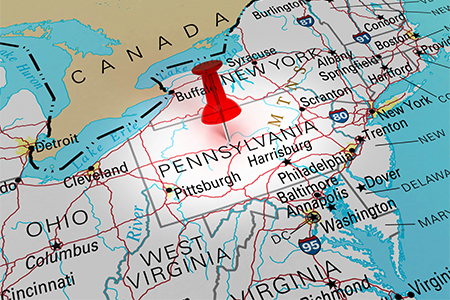You May Also Like
PENNSYLVANIA CPA EXAM & LICENSE REQUIREMENTS 2024
Here’s how to become a CPA in Pennsylvania.

If you are an accountant who desires to reach a career pinnacle as a Certified Public Accountant, you could potentially see your job prospects soar. Your status in the business community will likewise increase. As for your paycheck, you are likely to earn up to 15 percent more than the average accountant. Since each state has individual criteria for its initial CPA licensure, it’s important to study these criteria before starting down the pathway. Here’s how to become a CPA in Pennsylvania.
General Requirements
Education, examination and experience are the basic three E’s of the CPA licensure in Pennsylvania. Most states also require an ethics exam, but the Keystone State also forgoes a residency requirement. Rather, Pennsylvania does require that all licensees be at least 18 and have a Social Security number. You needn’t be a U.S. citizen to be a CPA in Pennsylvania. The state does ask that you have 150 semester hours for your license, but only 120 hours (including your bachelor’s) to sit for the CPA exam.
Academic Standards
The academic standards are the part of the license application that will require the most of your time and energy. Make sure that you are familiar with Pennsylvania’s specific requirements prior to beginning a course of study so that you are on track for licensure from the outset. As in many other states, you will need 150 semester hours to achieve full licensure, inclusive of a bachelor’s degree. Your credits must also be from a national accreditation agency acknowledged by the U.S. Department of Education. If you have a degree from a foreign university, your work must be evaluated by one of the following agencies:
- Foreign Academic Credentials Services, Inc.
- Educational Credential Evaluators, Inc.
- Josef Silny & Associates, Inc.
- NASBA International Evaluation Services
Your coursework must also adhere to certain standards. For instance, you cannot count any course whose title includes the words “money” or “banking.” You can also include any online, CLEP or community college courses, provided that the credits transferred to a 4-year institution. You must also have 24 hours of accounting coursework that includes the following subjects:
- Three hours of General Accounting
- Three hours of Business Law, Auditing or Finance
- Accounting
- Business Law
- Taxation
- Audit
- Finance
Though you only need 120 hours to sit for the CPA exam, you might consider moving on after your bachelor’s degree to work on a master’s degree. Continue to focus on accounting through a Masters in Accountancy (MAcc) or a Master of Business Administration (MBA) degree that offers enough courses in accounting to satisfy the Pennsylvania board.
CPA Examination
Once you have earned the requisite credits and are ready to sit for the CPA exam, you will need to submit an application to:
CPA Examination Services – PA
P.O. Box 198469
Nashville, TN 37219
Once your transcripts are accepted, you will receive a Notice to Schedule. From that point, you have six months to sit for the first part of the exam—whichever part comes first is up to you. Prometric is the testing service that supports the examination. There are many testing sites in Pennsylvania. You can find one in these cities:
- Clarks Summit
- Harrisburg
- Lancaster
- Conshohocken
- Allentown
- Monroeville
- Philadelphia
- Pittsburgh
Make sure that you are well prepared and rested the day of your test. Up to half of test takers must retake any one part of the 4-part exam. If your score is beneath 75, you will need to retake that portion, but only after a 60 day window has passed. The four parts are:
- Financial Accounting and Reporting–This part covers financial reporting frameworks from several industry experts. Candidates are asked to compare statements that reflect different reporting standards.
- Auditing and Attestation–This will test your knowledge of the International Standards of Auditing as well as U.S. standards.
- Regulation–Your professional and legal responsibilities are covered in this test.
- Business Environment and Concepts–This portion covers general business concepts and international business. Your writing skills will be put to the test as much as your knowledge in this section of the exam.
Experience
After you have passed the CPA exam, all that remains to complete is one year of experience. You can be employed in either the public or private sector. However, you may not count experience accrued while self-employed, in a partnership, or while working for a non-licensed accountant. The state requires that you complete 1,600 hours that demonstrate competency in some combination of the following areas:
- Attestation
- Audits
- Operational Audits
- Compiling financial statements
- Tax research
- Financial projections and analysis
- Management advisory
Once your tenure under a licensed CPA has concluded, you must have them submit a Verification of Experience form. That form must be completed and remitted to:
Pennsylvania State Board of Accountancy
P.O. Box 2649
Harrisburg, PA
17105-2649
Your career as a Pennsylvania CPA is sure to be rewarding. To ensure that your application adheres to the most current rules, visit the Board’s website: Pennsylvania State Board of Accountancy.